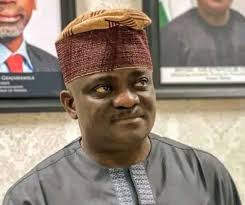The Imperative of Electoral Reform: Curbing Exploitative Practices and Strengthening Democratic Integrity in Nigeria
The Nigerian electoral landscape is currently marred by the presence of numerous political parties that contribute little to the democratic process but rather exploit it for personal gain. This phenomenon has raised concerns about the integrity of elections and the overall health of the Nigerian democracy. Oluwole Oke, Chairman of the Federal House of Representatives Committee on Foreign Affairs, has highlighted the urgent need for the Independent National Electoral Commission (INEC) to exercise its constitutional powers and deregister inactive and exploitative political parties. He argues that these parties, often dormant during campaigns, engage in post-election litigation with the sole aim of extorting money from winning candidates anxious to secure their mandates. This practice not only undermines the credibility of elections but also burdens the judicial system with frivolous cases, diverting resources from more substantial legal matters.
Oke identifies a concerning trend, the emergence of what he terms an "industry of political desperadoes," where individuals or groups register political parties not with the intention of genuinely participating in the democratic process but rather to exploit legal loopholes for financial gain. These opportunistic parties capitalize on the desperation of election winners who, fearing protracted legal battles and potential invalidation of their victories, often succumb to these extortionate demands. This practice not only erodes public trust in the electoral system but also discourages genuine political participation and competition. The proliferation of such parties also contributes to voter confusion due to overcrowded ballot papers, making the electoral process more complex and potentially undermining informed decision-making.
The existing legal framework, while empowering INEC to deregister non-compliant parties, has not been effectively utilized to address this issue. Oke emphasizes the importance of INEC proactively enforcing the provisions of Section 225A of the 1999 Constitution, which outlines grounds for deregistration, including failure to field candidates or win seats in elections. He advocates for a regular and rigorous "compliance and viability audit" of all registered political parties, with prompt deregistration of those failing to meet constitutional requirements. This proactive approach, he argues, is crucial to ensuring that only genuinely active and participatory parties remain on the register, fostering a more robust and competitive political environment.
Furthermore, Oke calls for legislative action to strengthen the doctrine of "locus standi" in electoral jurisprudence. This legal principle dictates who has the right to bring a case before the court. Oke proposes amending the Electoral Act to restrict the right to file election petitions to only those parties that actively participated in the election, thereby eliminating the opportunity for inactive parties to exploit the system for financial gain through frivolous litigation. This amendment would serve as a significant deterrent to the exploitative practices of these "political desperadoes" and streamline the election petition process, reducing the burden on the courts and promoting greater efficiency in the resolution of genuine electoral disputes.
The unchecked proliferation of inactive and exploitative political parties poses a significant threat to the integrity of Nigeria’s democratic institutions. By clogging the courts, eroding public trust, and undermining the credibility of elections, these parties impede the progress towards a truly representative and accountable government. Oke’s call for action is not merely a plea for administrative efficiency but a critical appeal for safeguarding the very foundations of Nigerian democracy. He highlights the urgent need for a multi-pronged approach involving both administrative action by INEC and legislative reforms by the National Assembly.
In conclusion, addressing the issue of inactive and exploitative political parties requires decisive action on multiple fronts. INEC must actively enforce existing constitutional provisions to deregister non-compliant parties, while the National Assembly must amend the Electoral Act to strengthen the doctrine of locus standi in election petitions. These measures are crucial not only to streamline the electoral process and reduce the burden on the judiciary but also to foster a more transparent, accountable, and truly democratic political landscape in Nigeria. The long-term health and vibrancy of Nigerian democracy depend on addressing this challenge and ensuring that the political arena is occupied by genuine participants committed to serving the public interest rather than exploiting the system for personal gain.


